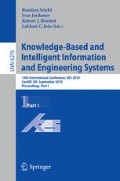Abstract
In this paper we outline a model for grounding of natural language statements being conditional statements extended with modal operators of possibility and belief. This work extends a detailed theory of modal language grounding proposed elsewhere. At first, some comments and intuitive semantics of modal conditional statements are presented. At second, a general structure of formal model, that covers this semantics is proposed. This model refers to the idea of possible worlds semantics. The grounding of modal conditional statements is defined by means of original concepts of epistemic satisfaction relation. The work sets up theoretical basis for further analytic and experimental evaluations.
Access this chapter
Tax calculation will be finalised at checkout
Purchases are for personal use only
Preview
Unable to display preview. Download preview PDF.
References
Ajdukiewicz, K.: Conditional sentence and material implication. Studia Logica 4(1), 135–153 (1956)
Cohen, P., Levesque, H.: Communicative Actions for Artifical Agents. In: Proc. of the 1st International Conference on Multi-agent Systems, San Francisco (1995)
Grice, H.P.: Meaning. Philosophical Review 88, 377–388 (1957)
Harnad, S.: The Symbol Grounding Problem. Physica D 42, 335–346 (1990)
Hintikka, J.: Knowledge and belief. In: An introduction to the logic of the two notions. Cornell University Press (1962)
Huhns, N., Signh, M.: Cognitive Agents. IEEE Internet Computing 2(6), 87–89 (1998)
Katarzyniak, R.: The language grounding problem and its relation to the internal structure of cognitive agents. Journal of Universal Computer Science 11(2), 357–374 (2005)
Katarzyniak, R.: Gruntowanie modalnego jêzyka komunikacji w systemach agentowych. Exit, Warsaw (2007) (in Polish)
Kripke, S.: Semantical Analysis of Modal Logic. Zeitschrift für Mathematische Logic und Grundlagen der Mathematik 9, 67–96 (1963)
Skorupa, G., Katarzyniak, R.: Extending modal language of agents’ communication with modal implications. Information systems architecture and technology, 127–136 (2009)
Strehl, A.L., Li, L., Wiewiora, E., Langford, J.: Pac. model-free reinforcement learning. In: Proc. 23nd ICML 2006, pp. 881–888 (2006)
Author information
Authors and Affiliations
Editor information
Editors and Affiliations
Rights and permissions
Copyright information
© 2010 Springer-Verlag Berlin Heidelberg
About this paper
Cite this paper
Skorupa, G., Katarzyniak, R. (2010). Applying Possibility and Belief Operators to Conditional Statements. In: Setchi, R., Jordanov, I., Howlett, R.J., Jain, L.C. (eds) Knowledge-Based and Intelligent Information and Engineering Systems. KES 2010. Lecture Notes in Computer Science(), vol 6276. Springer, Berlin, Heidelberg. https://doi.org/10.1007/978-3-642-15387-7_31
Download citation
DOI: https://doi.org/10.1007/978-3-642-15387-7_31
Publisher Name: Springer, Berlin, Heidelberg
Print ISBN: 978-3-642-15386-0
Online ISBN: 978-3-642-15387-7
eBook Packages: Computer ScienceComputer Science (R0)

